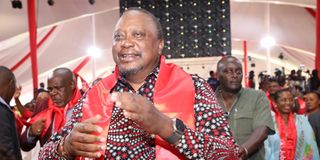Premium
Return Kenyatta’s phone, let him enjoy much-deserved retirement

Former President Uhuru Kenyatta at the Jubilee Party special National Delegates Convention (NDC) held at Ngong Racecourse Nairobi. 22/05/23
If you have found Hon. Uhuru Kenyatta’s cell phone, kindly contact the administrative office in State House responsible for former heads of state, or even your nearest police station. In any event, do not attempt to make contact with the Jubilee Party, where Kenyatta may, or may not, be party leader.
The former dominant political juggernaut dramatically dwindled from nearly 200 national legislators, two dozen governors and thousands of county assembly members, to about 30 members of Parliament and a governor. Its acrimonious factions are in ferocious contention for control of the party. Kenyatta leads the smaller faction.
It would be disingenuous to conclude that Kenyatta’s political predicament constitutes uncharted territory for him.
To the contrary, he is a notable, if not the foremost veteran of political death by inertia, having presided over rapid decay and death of successful parties before.
Betrayed and deceived
Besieged by demands for accountability from traumatised, disillusioned, betrayed and deceived Jubilee leaders and members, Kenyatta recently found himself in urgent need of refuge as Sabina Chege and Kanini Kega threatened to dislodge him as party leader and excommunicate him altogether from membership.
Deploying procedural sleights of hand and technical feints characteristic of his governing technology, Kenyatta recently convened a special general meeting of his faction.
Because he controls a shrivelled fringe faction of ebullient absurdists, Kenyatta needed special help by way of donated ‘delegates’ to populate the Ngong Racecourse, a last-minute venue secretly procured after cat-and-mouse interactions with city authorities.
In fact, Kenyatta’s difficulties in finding a suitable venue was a polite facsimile of the ordeals his opponents underwent when he was president.
To facilitate a strong turnout of donated delegates, Kenyatta invited Raila Odinga and the rest of Azimio’s leadership to grace his event.
A couple of elected leaders also made it, while the majority gave the thing a wide berth.
It does seem that some of the delegates in attendance were also part-time ‘peaceful protesters’ and ‘party mobilisers’ notorious for wearing black suits whilst wreaking terror in broad daylight. In the course of the meeting, it would appear that one of these delegates may have borrowed the former president’s cell phone and, perhaps, forgotten to return it.
Understandably, it was a fairly hectic time, and a very intense event. This is how it came to pass that the social media had reports and discussions of how Kenyatta was rendered incommunicado by his delegates.
Kenyatta’s fall from political grace is perfectly normal by his standard. He was a reluctant chairman of Kanu, the party which disdained his better prepared seniors to sponsor his first unsuccessful forays into parliamentary and presidential politics.
After conceding defeat in 2002, Kenyatta led the official opposition in Parliament for a brief period, before he defected to support Mwai Kibaki’s government.
Thoroughly unamused
Kanu, thoroughly unamused, ejected him, making him the first leader of official opposition to join government.
Kenyatta is not just a reluctant political leader; his entire professional career as a politician displays tremendous suspicion of the enterprise in its entirety, together with profound skepticism towards democracy insofar as it entails competition and contestation.
I will go so far as to suggest that Kenyatta’s baptisms of fire: in 1997 when he lost Gatundu to a literal stranger, and in 2002, when Mwai Kibaki’s Narc behemoth knocked him down and ran him over, constitute the seminal traumas which affirmed his antipathy and define Kenyatta’s attitude to the practice of politics.
He detests the uncertainty and suspense of leaving the outcome of political contests to third parties — the people — with full decisional autonomy.
As a result, he has always endeavoured to devise mechanisms of securing electoral outcomes that reduce elections to mere formalities.
He also appears to see political parties as instruments of treachery and other forms of ‘character development’, to be engaged at arm’s length only when need arises.
Burning ambition
A reluctant politician, Kenyatta has never harboured any burning ambition to lead at any level, nor espoused a clear vision beyond his immediate private needs.
He joined politics and Kanu out of obedience for Nyayo. He contested the presidency in 2002 for similar reasons and was afterwards groomed by a network of ethno-regional oligarchs into a ‘blue-eyed boy’ and political inevitability.
He surrendered leadership of the opposition and, a few years later, briefly gave up his presidential bid at the behest of ‘mademoni’.
Given this abundant pedigree of deficient motivation, entrusting Uhuru Kenyatta with a political party to manage in his retirement is a terribly mistaken proposition.
If his enthusiasm, if it can even be termed as such, was anaemic when he was in active political practice, be assured that it is utterly gone now that he is officially retired.
He is not even trying, and sees no reason whatsoever to. This is no one’s fault: it just is what it is.
What Azimio and Kenyatta’s faction should be concerned with as a priority right now, is finding the man’s phone and letting him enjoy a much deserved retirement.
Mr Ng’eno is an advocate of the High Court of Kenya.





